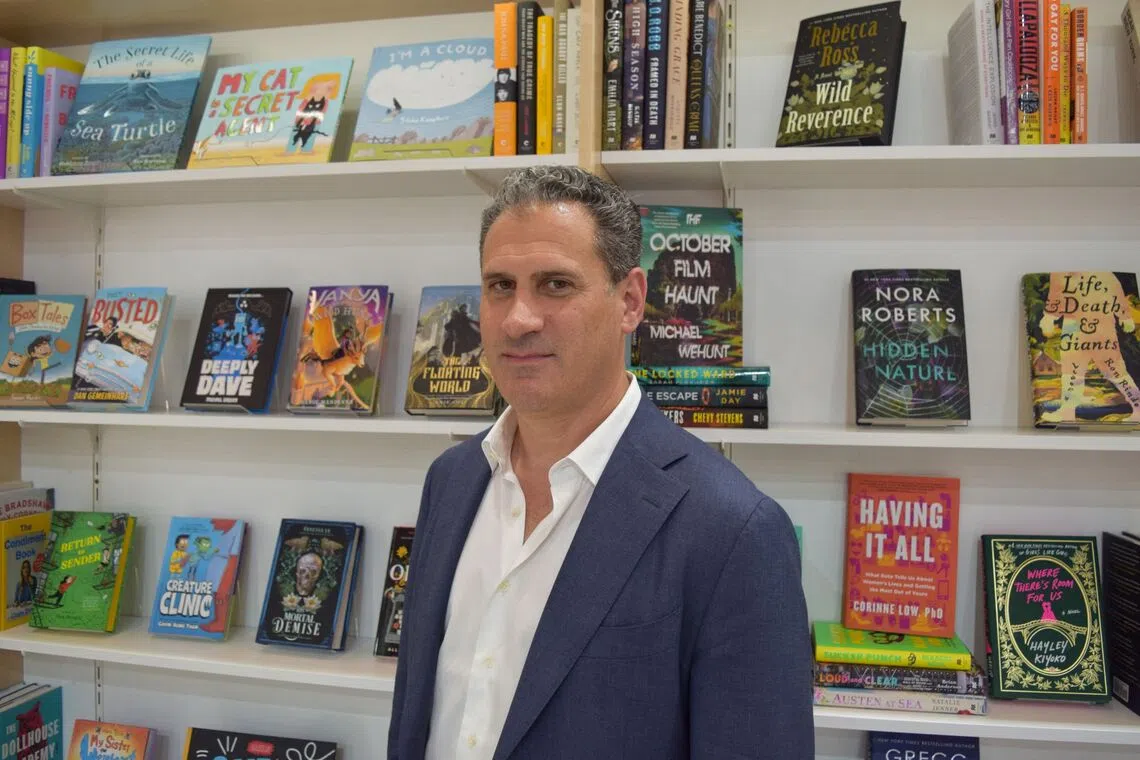Publishers fight back against US book bans
Sign up now: Get ST's newsletters delivered to your inbox

Mr Jon Yaged, chief executive of Macmillan Publishers, whose books are among those that have been targeted in the US.
PHOTO: AFP
Follow topic:
FRANKFURT – Escalating attempts to remove works featuring themes such as LGBTQ lifestyles and race relations from US bookshelves are facing growing resistance from publishers and rights groups, and was a major topic at the Frankfurt Book Fair in 2025.
Spearheaded by right-wing conservative groups, there has been an explosion in efforts to get books that are viewed as overly progressive banned in US schools and public libraries in recent years.
In 2020 just under 300 titles faced “challenges” – demands to restrict access to them or remove them entirely – across the United States, according to the American Library Association (ALA).
That number began surging the following year, and reached over 9,000 in 2023, said the non-governmental organisation (NGO), whose office for intellectual freedom has been tracking challenges since 1990.
“It’s an ideological mission from people on the right,” Mr Jon Yaged – chief executive of Macmillan Publishers, whose books are among those that have been targeted in the US – told AFP.
“This is just the most recent instance of hate demonstrating itself in culture,” said Mr Yaged at the Oct 15-19 Frankfurt event, the world’s biggest book fair, where the subject was hotly debated.
It is part of what Pen International says is a growing global trend, with the literary freedom NGO reporting a “dramatic increase in book bans and censorship” in recent times, from Afghanistan to Russia.
Conservative groups and politicians in the US pushing to get certain books removed reject accusations of censorship, insisting their aim is to limit access to inappropriate material.
Conservative education drive
US conservatives have for some years been pushing back against what they view as a progressive agenda in education, a drive that has won support from President Donald Trump’s administration.
According to the ALA, the most common reasons for challenging books in 2024 were claims of obscenity in books for minors, lesbian, gay, bisexual, transgender, and queer (LGBTQ) characters or themes and discussion of sensitive topics like race.
Among the most targeted titles were All Boys Aren’t Blue (2020), a collection of essays about author George M. Johnson’s experiences growing up as a gay black man in the US.
Others included The Bluest Eye (1970), a Toni Morrison work featuring depictions of sexual abuse and racial themes, and The Perks Of Being A Wallflower (1999), a coming of age novel featuring drug use and sex.
Conservative activists and local politicians, particularly in Republican-led states, often pressure school boards for book bans, but efforts to get works removed are increasingly taking on different forms, said Pen’s US branch.
Legislatures in some states have passed laws seeking to restrict access to certain titles, elected politicians have issued lists of books containing “explicit” material and some school districts have issued “do not buy” lists, targeting particular works, according to the group.
Book bans in Florida
Pen said the highest number of instances of access to school books being restricted in 2024 was documented in Florida, where Republican governor Ron DeSantis has pushed conservative education policies that have included banning classroom discussion of sexuality and gender identity.
Those campaigning to limit access typically argue they are seeking to protect youngsters.
Conservative group Mums for Liberty said recently that “challenging the placement of obscene materials in school libraries is not censorship or banning”.
“It is a reasonable demand to prevent children from being exposed to age-inappropriate materials,” the group said in a statement cited by an affiliate of CBS News.
Macmillan and other major publishers including Penguin Random House and HarperCollins, alongside authors and advocacy groups, have lodged legal challenges against attempts to restrict access to books, and have had some successes.
In some school districts, community members, from parents to authors and students, have also fought back against book bans.
Authors sense a worsening climate for works depicting minority groups beyond the US.
“It is getting worse globally,” US author Lawrence Schimel, whose books featuring children with same-sex parents have run into problems in Russia and Hungary in recent years, told AFP.
Mr Schimel added, however, that he believed it was crucial for kids to be able to continue seeing such works: “It helps them to be accepting of other people’s diversity.”
Despite the mounting challenges, Mr Yaged of Macmillan Publishers sounded determined.
“As long as there have been books, there have been people trying to ban books,” he said. “And they haven’t won as long as we keep up the fight.” AFP

